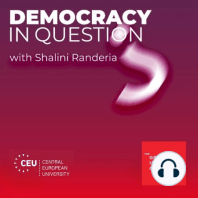30 min listen

Populism and democracy’s ‘critical infrastructure
Populism and democracy’s ‘critical infrastructure
ratings:
Length:
35 minutes
Released:
Dec 8, 2021
Format:
Podcast episode
Description
Glossary for DiQ ep 7 series 3 – Jan Werner MüllerWho was Alexis de Tocqueville?(pg. 1 tocquevillian question of the transcript or 00:1:08)French sociologist and political theorist Alexis de Tocqueville (1805-1859) traveled to the United States in 1831 to study its prisons and returned with a wealth of broader observations that he codified in “Democracy in America” (1835), one of the most influential books of the 19th century. With its trenchant observations on equality and individualism, Tocqueville’s work remains a valuable explanation of America to Europeans and of Americans to themselves. What is nativism?(pg. 1 of the transcript or 00:4:42)Nativism represents the political idea that people who were born in a country are more important than immigrants. Source. Who is Marine Le Pen?(pg. 3 of the transcript or 00:10:03)Marine Le Pen, French politician who succeeded her father, Jean-Marie Le Pen, as leader of the National Front (later National Rally) party in 2011. She was that party’s candidate in the 2017 French presidential election. In 1998 she joined the administrative apparatus of the National Front, which had been founded by her father in 1972 and was the main right-wing opposition to France’s mainstream conservative parties. She served as the director of the party’s legal affairs until 2003, when she became the National Front’s vice president. The following year she made a successful run for a seat in the European Parliament where she joined her father in that body’s nonaligned bloc. As Le Pen emerged from her father’s shadow to become a national figure in her own right, she distanced herself from some of his and the party’s more extreme views. While she embraced the National Front’s established anti-immigration stance, she rebranded the party’s traditional Euroscepticism as French nationalism and she was a vocal critic of the anti- Semitism that has marginalized the party in the past.In June 2018 Le Pen announced that the National Front would change its name to Rassemblement National (National Rally), in an apparent effort to distance the party from its overtly neofascist and anti-Semitic past. The National Rally topped the field in EU parliamentary elections in 2019, and opinion polling indicated that they were likely to carry that momentum into French regional elections in 2021. The party performed far below expectations in the first round of balloting, however, in an election that was characterized by extremely low voter turnout. Source What was the Fairness Doctrine?(Page 6 of the transcript or 00:25:14)U.S. communications policy (1949–87) formulated by the Federal Communications Commission (FCC). Required licensed radio and television broadcasters to present fair and balanced coverage of controversial issues of interest to their communities, including by granting equal airtime to opposing candidates for public office. The fairness doctrine was never without its opponents, however, many of whom perceived the equal airtime requirement as an infringement of the right to freedom of speech enshrined in the First Amendment to the Constitution.In 1987 the FCC formally repealed the fairness doctrine but maintained both the editorial and personal-attack provisions, which remained in effect until 2000. In addition, until they were finally repealed by the commission in 2011, more than 80 media rules maintained language that implemented the doctrine. Source Who was John Dewey?(page 7 of the transcript or 00:28:02)John Dewey (1859–1952) was one of American pragmatism’s early founders, along with Charles Sanders Peirce and William James, and arguably the most prominent American intellectual for the first half of the twentieth century. Dewey’s educational theories and experiments had a global reach, his psychological theories had a sizeable influence in that growing science, and his writings about democratic theory and practice deeply influenced debates in academic and practical quarters for decades. Dewey also developed exten
Released:
Dec 8, 2021
Format:
Podcast episode
Titles in the series (77)
What keeps democracies alive? by Democracy in Question?